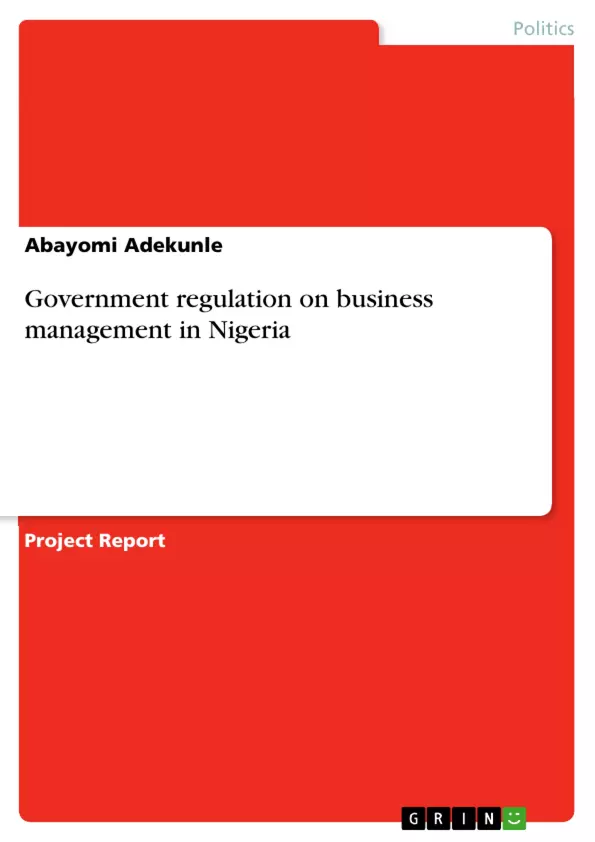There are various aims behind the course of this study. The first objective is to highlight the reasons for government regulation on business management in Nigeria. Then, the study examines the role of government regulation in the development of business management in Nigeria and it analyzes the strategies used by government in regulating business management in Nigeria. The last objective is to examine the effects of government regulation on business management in Nigeria.
A government formulates many rules and regulations that guide businesses. Businesses will normally change the way they operate according to the influence these rules and regulations have on the competitiveness and profitability of businesses. Business owners must comply with the regulations established by Federal, State and Local Government. Small business is facing many challenges nowadays, none of which are more forbidding than a burden. Federal government regulations and mandates threaten investment and stifle job growths. When the government imposes regulations on small businesses that drive up the cost of doing business, it’s like imposing a tax. A tax is a compulsory contribution to the state revenue which the government determines according to the workers’ income and business profit and which is also added to the cost of some goods, services and transactions.
A government can implement a policy that can change the social behavior in the business environment. For instance, the existence of the Nigeria Breweries Plc operation under the company law regulating the activities of business enterprises is due to the fact that the following itemized law acts have been regulating the activities of this company with the motive of enhancing the social, political and economic growth and development of the country. Some of the agencies responsible for business regulations are the Standard Organization of Nigeria (SON), the Anti-Counterfeiting Collaboration (ACC), the Music Regulation of Nigeria (MRN) etc.
Therefore, it is clear that the role of a government is to protect and represent the interest of the society and the citizenry in which business operates. It can be further said that a government through regulations protects consumers from abuse and ensures efficiency in the use of resources and promotes equitable distribution of income.
Table of Contents
- CHAPTER ONE INTRODUCTION
- INTRODUCTION
- STATEMENT OF THE PROBLEM
- OBJECTIVES OF THE STUDY
- SIGNIFICANCE OF THE STUDY
- SCOPE OF THE STUDY
- STATEMENT OF THE HYPOTHESIS
- CHAPTER TWO LITERATURE REVIEW
- CHAPTER THREE METHODOLOGY
- CHAPTER FOUR DATA ANALYSIS
- CHAPTER FIVE SUMMARY OF FINDINGS, RECOMMENDATIONS AND CONCLUSION...
Objectives and Key Themes
This research aims to investigate the impact of government regulations on business management in Nigeria. The study seeks to highlight the reasons for these regulations, examine their role in business development, analyze the strategies employed by the government, and ultimately assess the effects of regulations on business management within the Nigerian context.
- The influence of government regulations on business management in Nigeria.
- The role of government regulations in fostering business development.
- The strategies employed by the government to regulate business management.
- The effects of government regulations on business management in Nigeria.
- Challenges faced by government regulations in developing countries, particularly in Nigeria.
Chapter Summaries
- Chapter One: Introduction This chapter introduces the research topic by outlining the influence of government regulations on businesses, particularly focusing on the challenges faced by small businesses in Nigeria. It further defines the problem by highlighting the lack of technology, managerial skills, and effective legislature. The chapter then presents the research objectives, significance, scope, and hypotheses.
- Chapter Two: Literature Review This chapter explores existing literature on the topic of government regulations and their impact on business management, providing a theoretical framework for the research. It will review studies conducted in both developed and developing countries to establish a comparative analysis of the effects of government regulations on business performance. The chapter will also discuss the complexities of regulatory environments, considering factors such as political stability, economic conditions, and cultural contexts.
- Chapter Three: Methodology This chapter details the research design and methodology employed in the study. It will outline the research approach, data collection methods, and data analysis techniques used. It will also address the specific sampling methods, ethical considerations, and limitations of the research. This chapter provides a transparent and justifiable account of the research process to ensure the credibility and reliability of the findings.
- Chapter Four: Data Analysis This chapter presents the analysis of data collected through the chosen research methods. It will use statistical and qualitative techniques to examine the relationships between variables and interpret the findings in relation to the research questions and hypotheses. This chapter will demonstrate the rigor of the research by systematically analyzing the data to draw meaningful conclusions.
Keywords
This research centers on the impact of government regulations on business management in Nigeria. Key terms and concepts explored include: government regulations, business management, small and medium enterprises, economic development, regulatory environment, policy analysis, compliance, economic growth, challenges, opportunities, and case studies.
- Citation du texte
- Abayomi Adekunle (Auteur), 2017, Government regulation on business management in Nigeria, Munich, GRIN Verlag, https://www.grin.com/document/374849



